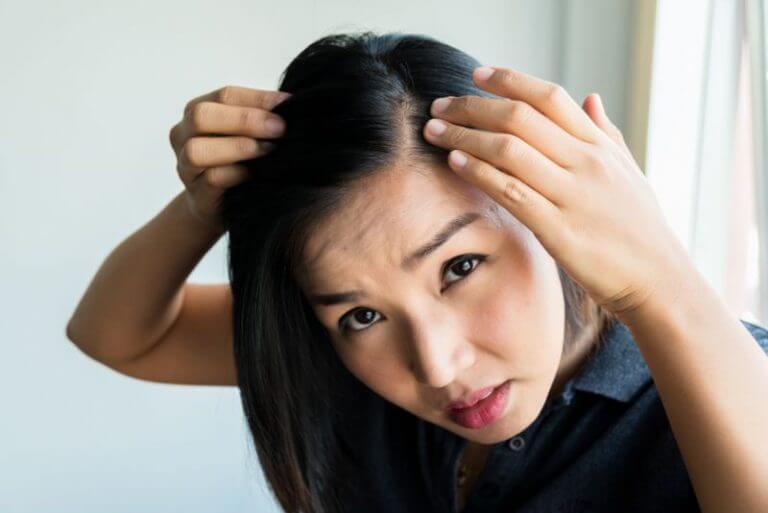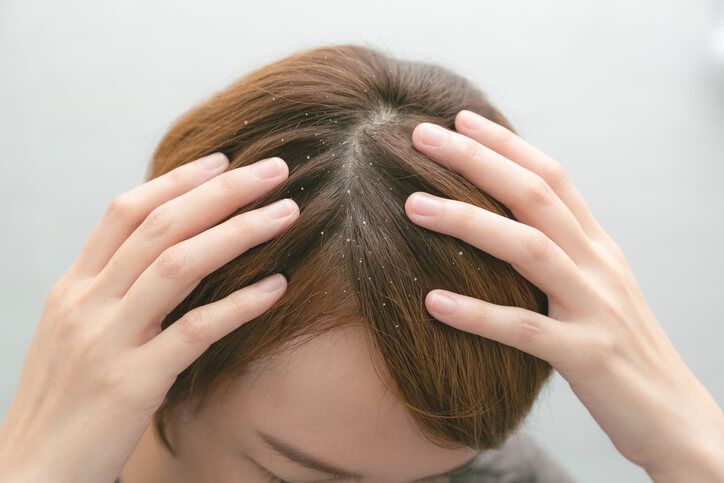
- Home
- Trend
- Weight Loss Strategies
- Acne Tips
- Hair Health Information
- Blemish Removal Tips
- Acne Scar Removal Tips
- Muscle Building Techniques
- Intimate Care Tips
- Postpartum Intimate Care
- Eye Bags Wiki
- Tips for Face Slimming
- Secret of Permanent Hair Removal
- Breast Enlargement Tips
- Cure to Snoring
- Marionette Lines
- Skin-Tightening Secrets
Don’t underestimate a dry scalp—it can cause itching, dandruff, and even lead to hair loss in serious cases! Many women pay close attention to skincare, but hair is like a second face and also deserves careful care. If a dry scalp is not properly addressed, the buildup of dead skin cells can turn into visible white flakes, leading to clogged follicles and significantly increasing the chances of female hair loss, receding hairlines, bald patches, and thinning hair. Let’s get to the root of dry scalp problems together! Below, we’ll explain the causes of dry scalp and how to improve it.
Causes of Dry Scalp

Do you often feel your scalp is itchy? While a dry scalp may not pose a major health risk, the associated itching and dandruff can affect your appearance and how others perceive you. There are many different causes of dry scalp. Here are some of the most common:
Cause 1: Seasonal Changes
The scalp, like facial skin, becomes more fragile and sensitive with seasonal changes. During seasonal transitions—especially in dry autumn and winter—the scalp produces less sebum, and dead skin cell turnover accelerates, leading to itching or dandruff, which causes dryness.
Cause 2: Unsuitable Shampoo Products
Just like skin, scalps vary in type. If you have a naturally dry scalp and use shampoos with strong cleansing properties, they can strip away the natural oil barrier, causing moisture loss and worsening dryness. This also increases the risk of dandruff.
Cause 3: Frequent Hair Styling
It's natural for women to want beautiful hair, and many go for regular dyeing and perming. However, these treatments often contain strong chemicals that can damage scalp health. Frequent styling can cause inflammation, redness, and dryness.
Cause 4: Hives (Urticaria)
Sometimes, dry scalp is linked to skin conditions such as urticaria, an allergic reaction that appears on the skin—and sometimes the scalp—as red, raised, extremely itchy bumps. These flare-ups appear suddenly but usually disappear quickly.
Cause 5: Scalp Eczema
Dry scalp can also be a symptom of scalp eczema. Like other areas of the body, the scalp can suffer from eczema, which typically presents as dryness, itching, redness, and dandruff. Scalp eczema often recurs with weather changes and requires close attention.
Cause 6: Washing Hair with Water That’s Too Hot
High water temperature can trigger dry scalp by stripping away natural oils that moisturize the scalp. Without this protective layer, the scalp becomes dry and itchy. Always pay attention to water temperature to avoid harming the scalp.
Cause 7: Poor Diet
Diet also affects hair health! Many modern women with busy work schedules opt for takeout, but restaurant food often contains MSG and additives. A heavy diet can slow metabolism and weaken the immune system, increasing the risk of dry scalp.
Signs of Dry Scalp

Many women think dry scalp is just a common or seasonal issue that will improve with time. But ignoring it may lead to serious hair loss! Check out the signs below to see if you’re affected:
Sign 1: Itchy Scalp and Dandruff
These symptoms often arise during seasonal changes. The scalp may become oily with excess sebum production, which can ironically contribute to scalp dryness.
Sign 2: Excessive Oil Production on the Scalp
If your scalp is often greasy and not properly treated, it can clog follicles and promote bacterial growth, leading to abnormal hair loss.
Sign 3: Dry and Easily Broken Hair
A dry scalp usually means the hair follicles lack moisture and nutrients. Without nourishment, your hair strands won't receive the support they need and will become dry and brittle. Women with dry scalps often also experience breakage.
免費體驗
F8 Hair Regrowth Treatment
1 Minute Self-Registration
Date should not be before minimal date
How to Improve Dry Scalp? 6 Tips for Everyday Life
Severe itching caused by dry scalp can disrupt daily life. Here’s how to improve it:
Tip 1: Wash Hair with Warm Water
Overly hot water can dry out your scalp. Regardless of the season, avoid using very hot water to wash your hair. Water around 38°C (body temperature) is ideal to prevent dryness.
Tip 2: Adjust How You Use Your Hair Dryer
Always dry your hair immediately after washing to avoid headaches. If you want to improve dry scalp, pay attention to the hair dryer’s temperature and usage. Excessive heat directly on the scalp can worsen dryness. Try to reduce drying time and towel-dry your hair beforehand to minimize dryer use.
Tip 3: Change Your Lifestyle Habits
Poor habits and lack of rest affect overall blood circulation, making it harder for the scalp to get nutrients. This can lead to dryness and hair loss. To improve scalp health, maintain a nutritious, light diet and ensure enough sleep every day.
Tip 4: Regular Scalp Massage
Good blood circulation is essential for healthy hair. Poor circulation prevents nutrients from reaching your hair, which can cause dryness, dandruff, and hair loss. Regular daily scalp massages promote circulation, improve scalp condition, and give you shinier, healthier hair.
Tip 5: Carefully Choose Your Shampoo
There are many shampoos for different scalp issues, but if you have dry hair, choose carefully. Don’t immediately go for anti-dandruff shampoos—they may be too harsh and worsen dryness. Opt for mild, natural-ingredient shampoos instead.
Tip 6: Reduce Hair Dyeing and Perming
Hair dyes and chemical solutions used during coloring and perming contain large amounts of harsh chemicals. Frequent dyeing can weaken and damage the hair, making the scalp drier as a result. To restore scalp health, it’s best to give your hair a break. Try to reduce how often you dye or perm your hair—ideally spacing treatments 3 to 6 months apart.
Prevent Dry Scalp! Try These At-Home Remedies for Scalp Massage
Just like other parts of the body, the scalp can become dry and sensitive due to lack of moisture. The following home remedies may help soothe dry scalp:
Remedy 1: Aloe Vera
Aloe vera is highly effective in relieving dry scalp. If you have dryness, apply fresh aloe vera gel directly onto your scalp and leave it on for about 10 minutes before rinsing thoroughly. Aloe vera helps reduce itching and flaking, while also moisturizing your hair.
Remedy 2: Tomato Juice
Tomato juice isn’t just for drinking—it’s rich in vitamins and minerals that nourish the hair and improve scalp dryness. Mash 3 to 4 tomatoes and apply the mixture evenly over your scalp. Leave it on for 10 minutes, then rinse thoroughly.
Remedy 3: Baking Soda
Baking soda is a household staple for cleaning, and it can also help relieve dry, itchy scalp. First, wet your hair thoroughly. Then take a palmful of baking soda and gently massage it into your scalp. You don’t need shampoo—just rinse with water afterward. Initially, your hair may feel a bit dry, but within a few days, your scalp will start producing natural oils, your hair will soften, and dandruff will decrease.
DIY At-Home Scalp Care to Improve Dryness
You don’t always need to go to a salon to treat dry scalp. Try these simple at-home scalp care techniques to keep dryness at bay:
Step 1: Use a Brush to Massage Before Shampooing
Before shampooing, gently massage your scalp with a brush to remove dust and oil. Brushing also helps exfoliate dead skin and promotes better blood circulation in the scalp.
Step 2: Deep Cleanse the Scalp
Choosing the right shampoo is key to improving scalp dryness. Go for low-irritation formulas that reduce stimulation to the scalp and hair.
Step 3: Nourish the Scalp with Treatment Essence
To promote a healthy scalp, apply a scalp treatment essence. This provides a better environment for hair growth and overall scalp health.
免費體驗
F8 Hair Regrowth Treatment
1 Minute Self-Registration
Date should not be before minimal date
Root Solution for Dry Scalp: Recommended Hair Regrowth Treatment – Perfect Medical F8
People with dry scalps often also struggle with other issues like itchiness, dandruff, and excessive oiliness. If the scalp becomes overly oily and remains untreated, it can clog follicles and lead to bacterial growth, eventually causing abnormal hair loss. That’s why dry scalp should be treated early!
We highly recommend the Perfect Medical F8 Hair Regrowth Treatment, a star-rated solution for both hair and scalp care.
This treatment follows three core principles: “Nourish, Revitalize, Regrow.” It awakens the scalp, stimulates hair follicles, and restores strong, healthy hair.
• Nourish: Deeply cleanses pores and the scalp to remove dead skin and chemical buildup.
• Revitalize: Uses medical-grade laser therapy to deliver powerful hair-nourishing ingredients, accelerating cell renewal to restore healthy hair follicles.
• Regrow: A potent growth serum activates stem cells in the scalp, promoting regeneration of blood vessels and skin cells. New cells form quickly, rebuilding strong scalp tissue. This greatly improves scalp health, reducing breakage and dryness in the hair.
免費體驗
F8 Hair Regrowth Treatment
1 Minute Self-Registration
Date should not be before minimal date
FAQ

What is dry scalp?
Dry scalp, if ignored, can lead to serious hair loss. It is often accompanied by itchiness, dandruff, and excess oil production. When the scalp is persistently oily and not properly treated, follicles can become clogged, bacteria may thrive, and in severe cases, abnormal hair loss can occur. Dry scalp also means the hair follicles aren’t receiving enough moisture and nutrients. Without proper hydration, the scalp can’t transport nutrients to the hair, leading to brittle, breakable strands.
What causes dry scalp?
Like facial skin, the scalp becomes fragile and sensitive with seasonal changes. In autumn and winter, sebum production drops and dead skin accumulates faster, making dryness, itchiness, and dandruff more likely. Other causes include unsuitable shampoos, frequent dyeing and perming (which use harsh chemicals), scalp eczema or hives, and poor diet. Many busy women rely on takeout, which is often high in MSG and additives. A heavy diet slows metabolism and weakens immunity, increasing the risk of scalp dryness.
What lifestyle habits help improve dry scalp?
Use warm water (around 38°C) for hair washing to avoid stripping natural oils. Change how you use a hair dryer: Always dry your hair right after washing to prevent headaches, but avoid using high heat directly on the scalp. Towel-dry first and shorten dryer time. Massage your scalp regularly to improve blood flow, so the scalp gets enough nutrients. Limit dyeing and perming: Give your hair time to recover—space treatments 3 to 6 months apart for healthier scalp and hair.
Can dry scalp lead to hair loss?
Yes. Dry scalp often comes with itchiness, dandruff, and excessive oil. If the oil isn’t managed, follicles can clog, bacteria can grow, and hair may fall out abnormally. When the scalp lacks blood flow and nutrients, the hair becomes weak, dry, and prone to breakage.
What treatments are available for dry scalp?
The Perfect Medical F8 Hair Regrowth Treatment is a comprehensive solution. Based on Nourish, Revitalize, Regrow, the process involves cleansing, laser therapy, and a potent growth serum to improve scalp condition, regenerate healthy tissue, and grow stronger, more resilient hair.








